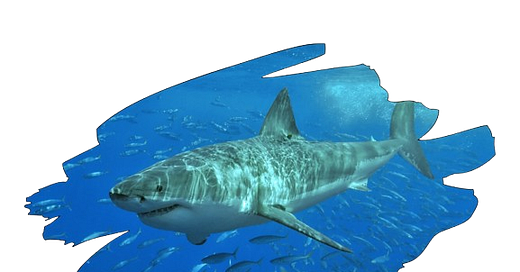Sleeping Sharks, Einstein vs Bergson, and Feeling Stuck in Life
Swimming and flying - uncommon sleep - the Einstein-Bergson debate - reference frames
Sharks and swifts
A shark must swim or it drowns. It is a creature of cartilage and endless teeth, a torpedo of muscle and perpetual motion.
This is only half true.
The majority of shark species can engage in ‘buccal pumping’. By moving their cheeks they can suck oxygen-rich water over their gills, even when they are at relative rest. Exceptions such as the iconic great white, mako, whale shark, and hammerheads are obligate ram ventilators1 — they can only breathe by forcing water over their gills through swimming. For them, it is literally swim or die2. Movement is breath, stillness is death. These sharks cannot afford to get stuck.
Maybe this is why I feel breathless, gasping for air after almost six years in the same place, in the same situation. I am stuck. Shark kin, teach me how to breathe again. But I’m not a shark. Nothing so impressive. A flailing Icarus, perhaps, featherlight and gently sharp. A scythe in flight.
The common swift is a small, unprepossessing bird that spends more than 99% of its ten-month migration in the air. Some swifts never touch ground at all during their seasonal travel from Europe to the Southern shores of Africa. Superficially, swifts resemble swallows, but this is an example of convergent evolution — the independent evolution of similar features in species that are not closely related. Swifts are a family on their own, closer to hummingbirds than to passerines. The demands of extended flight have shaped swifts into dark sickles that slice the air.
For sharks, swimming is life; for swifts, flight is survival.
Perhaps I am a swift with broken wings.
Perchance to sleep
Still, let me imagine myself a shark gliding through the water, insatiable and unstoppable. I know only hunger and survival; an unquenchable desire to eat the world so that the hole in my soul may be filled.
Yet, like all animals with a complex brain, sharks need sleep, as do swifts.
How do they balance the paralysis of slumber with the relentless necessity of motion?
The truth is that shark sleep remains largely still a mystery.
Only in 2022 did scientists find clues that buccal pumping sharks (like draughtsboard sharks) engage in periods of rest marked by energy conservation — a drop in metabolism and a ‘flat body posture’. But what about the perpetual motion swimmers? We have footage of a great white that appears to be napping. She (Emma the shark) moves to shallower water, slows down, and opens her mouth against the current. That’s all we have, scarce behavioral observations. If swimming is breathing for great whites, perhaps Emma’s behavior is as instinctive as our breathing during sleep. But the neurological nuts and biological bolts of shark sleep? As of 2024, we don’t know.
Observations from related birds help us paint a clearer picture for the common swift. Like many birds, the common swift likely engages in unihemispheric slow-wave sleep (USWS) — brain halves take turns sleeping and being awake3. Fun fact: if you see a bird with one eye open and one eye closed, it may literally be half asleep.
The common swift, like its sister species the pallid swift, does not only sleep with half a brain, it has also perfected the power nap. The evidence is circumstantial, but some researchers suggest that swifts take mini-naps when gliding down from high altitude.
Maybe I’m half-asleep too. Asleep while awake. Yawning and yawing as I roll through an endless sequence of similar days. Does drudgery even count as wakefulness, or is that one of the grand illusions that keeps us stuck while dreaming of movement?
Ideally, adult humans get five sleep cycles in a day. Since each sleep cycle lasts between 90 and 110 minutes, that’s about seven and a half to nine hours. As with many human traits, though, sleep duration fits remarkably well on a bell curve.

On the extreme left of that graph, we find sleep schedules such as the Uberman schedule — a 20-minute nap every four hours, formalized in 1998 by philosophy student Marie Straver to tackle her insomnia and building on Leonardo da Vinci’s and Nikola Tesla’s polyphasic short nap schedule. Buckminster Fuller had a similar Dymaxion scheme — a 30-minute nap every six hours. Margaret Thatcher and Voltaire reportedly slept only four hours per day4. Kafka’s insomnia was so profound that scientific papers have been written about it. Emily Brönte was another literary insomniac. She took to walking in circles until exhaustion claimed her and even then sleep brought her no joy.
Sleep brings no joy to me,
Remembrance never dies,
My soul is given to mystery,
And lives in sighs.
On the other side of the spectrum, we find outliers such as Goethe and Einstein, who (apocryphally) slept for at least ten hours per day. Plus extra naps5.
Einstein? Time to talk about time.
Relative reference frames, or the duration debate
Let me imagine myself a swift, soaring gracefully and watching the world turn beneath me. Is it me that is moving or the world? Can I even tell?
In the 1543 book On the Revolutions of the Heavenly Bodies, Nicholas Copernicus went straight for the geocentrical and religious jugular by suggesting that the sun and not the earth was the linchpin of what we now call the solar system. In 1610, Galileo detailed his heavenly observations in Sidereus Nuncius, including four moons that orbited Jupiter. Based on his observations, he saw no choice but to defend Copernican heliocentrism. In 1633, the Inquisition came after him6, eventually forcing him into house arrest until his death.
It is the world that moves, not the sun. In a grander view, the sun too moves, of course. Whether or not something moves depends on your point of view. Your reference frame. It’s all relative.
Even time.
in 1922, Albert Einstein was invited to give a lecture on his theory of relativity at the Société française de philosophie. In the audience sat the French philosopher Henri Bergson. What happened next is known as the Einstein-Bergson debate on special relativity7. Bergson noted that Einstein’s theory said nothing about the subjective experience of time — the feeling of duration. While it is generally thought Einstein won the debate, this recent Aeon essay by philosopher Evan Thompson proposes that we shouldn’t dismiss Bergson too soon,
… when we think of time as the seconds on a clock, we spatialise it as an ordered series of discrete, homogeneous and identical units. This is clock time. But in our daily lives we don’t experience time as a succession of identical units.
More precisely, Bergson’s point I want to arrive at is that there is no absolute reference frame. Many of the thought experiments involving special relativity focus on time dilation. The twin in the spaceship ages slower than their earthbound sibling, and (confirmed experimentally in 1971) putting clocks in planes that fly around the world in opposite directions results in a nanosecond-but-measurable time difference. But the twin in the spaceship or the pilot in the plane don’t experience time going slower. The time dilation only exists when one twin's reference frame meets the other's. We’re always in a reference frame, and that reference frame is always defined in relation to another reference frame.
Let me imagine myself not a shark or a swift, but a man worried about being stuck. Is it the world that moves around me, leaving me behind? Am I moving faster than the world turns, running on fumes of exhaustion and caffeine?
The truth is that we are both moving, the world and I.
We are all moving, relative to one another. We are all stuck in our reference frames and judge ourselves and others accordingly. On good days, our reference frames meet, like lovers’ lips in a rebellious bid to defy time with a kiss that lasts both an eternity and a single breath.
If I must be a shark, let me find an ocean current that suits me. If I must be a swift, let me soar on thermals that circle Olympian peaks.
If I must be me, let me find the air to breathe.
Thanks for giving me a bit of your time, dilated or compressed. In the age of the algorithm, engagement is oxygen for writers (though it will never beat word of mouth).
If you appreciate the work behind these posts and want more writing, consider upgrading your subscription
a) I know, sounds like a spaceship. b) Roughly 5% of shark species are obligate ram ventilators. Different tuna and billfish (swordfish, marlin, and sailfish) species are obligate ram ventilators too.
Sharks don’t have a swim bladder that aids with buoyancy, so ‘sink or swim’ applies as well.
Also common in marine mammals that have to come up to breathe. Remarkably,
Compared to bihemispheric sleep, unihemispheric sleep would mean a reduction of the time spent sleeping and of the associated recovery processes. However, the behavior and health of aquatic mammals and birds does not seem at all impaired by the reduction of sleep. The neural mechanisms of unihemispheric sleep are unknown…
In Voltaire’s case, this might have something to do with his infamous coffee addiction. No doubt exaggerated through history, he is said to have drank up to fifty cups of chocolate-infused coffee per day. He was a firm believer in the brew’s creativity-enhancing effects. Talking about coffee reminds me that I owe someone a virtual cookie… 🍪
As you can imagine, most of that paragraph is little more than hearsay — even where there is solid evidence, these sleep schedules represent only a period in life. For example, after two years, Fuller, despite “the most vigorous and alert condition I have ever enjoyed,” stopped the Dymaxion schedule because his business associates “insisted on sleeping like other men.” Lazy bums.
When the Catholic Church unkindly asked him to recant his defense of heliocentrism, Galileo is rumored to have muttered, “E pur si muove“ (and yet it moves). This, however, is a story based on a mix-up of two Belgian paintings. He (probably?) never said it.
Mexican-American historian of science Jimena Canales wrote a whole book about it, The Physicist and the Philosopher: Einstein, Bergson and the Debate that Changed Our Understanding of Time. I haven’t read it yet. If you have, let me know what you thought!










Excellent post, very enjoyable as well. I think people are also under certain circumstances capable of hemispheric sleep, based on anecdotal personal evidence
Such great writing! Especially because the topic isn't a main interest, yet I was fascinated. My inbox is getting cluttered with Substacks. I don't have time to read all the good essays so I leave them there until a Friday night, home with a cold, and give them the time they deserve. Bravo Gunnar!